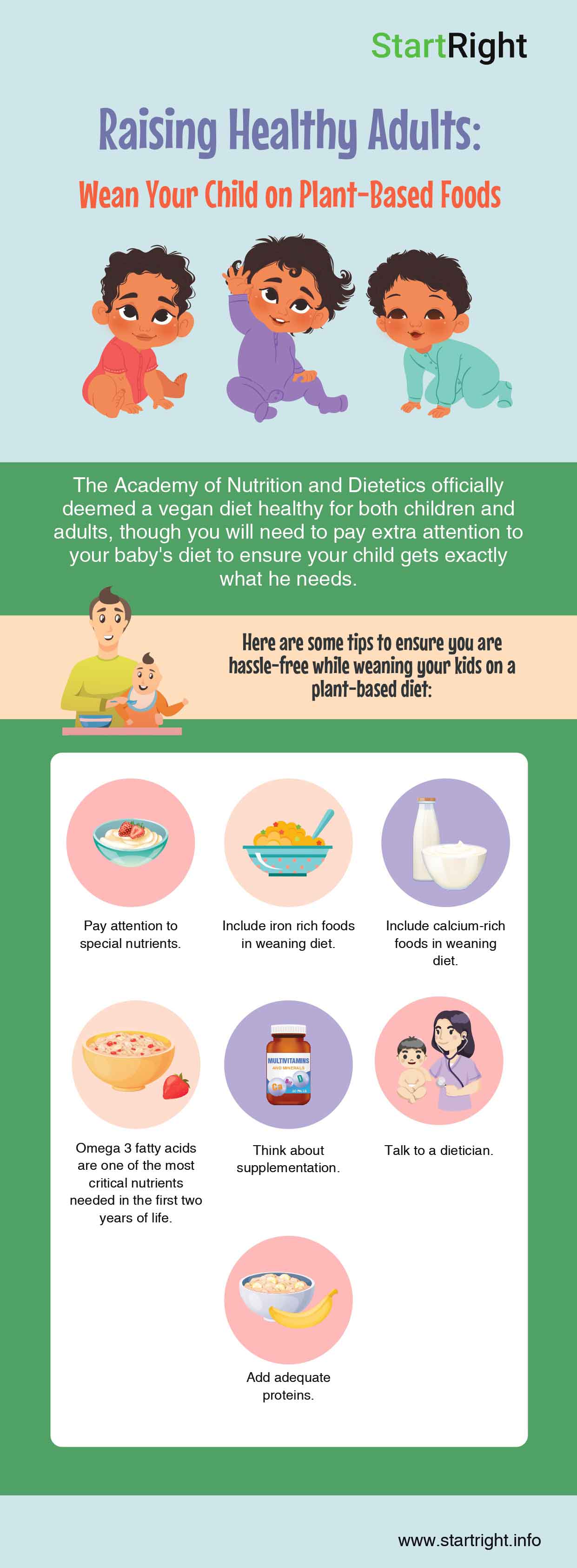Raising children on a plant-based diet is a wonderful thing to do as a parent and it is possible to raise healthy children on this diet. The Academy of Nutrition and Dietetics officially deemed a vegan diet healthy for both children and adults, though you will need to pay extra attention to your baby’s diet to ensure your child gets exactly what he needs.
Infographic Click Here | Infants may be introduced to plant-based solids as a result of the family wishing to eat a plant-based diet, for example, due to veganism; or it may be required for health reasons such as cow-milk allergy. |
Here are some health benefits of a plant-based diet:
Children fed animal-products tend to develop chronic diseases, such as coronary heart diseases, diabetes, and arthritis, as adults.
1) Plant-based diets are low in saturated fats and cholesterol, both of these are major risk factors in development of coronary artery disease (CAD).
2) Carnitine, found primarily in meat, may be converted in the body by the gut bacteria to produce trimethylamine N-oxide (TMAO). High levels of trimethylamine n-oxide are associated with inflammation, atherosclerosis, heart attack, stroke, and death. N-Glycolylneuraminic acid (Neu5Gc) found in meat is known to promote chronic inflammation.
3) Processed meat and dairy products are heavily laced with antibiotics and hormones which can give rise to antibiotic resistance in humans.
4) When flesh is cooked, compounds called polycyclic aromatic hydrocarbons, heterocyclic amines, and advanced glycation end products are formed. These compounds are carcinogenic and promote chronic diseases.
Most parents may think twice before exposing their children to such dietary toxins and may choose to bring them up on a clean, plant-based diet that poses less risk to their health as kids and adults.
Here are some tips to ensure you are hassle-free while weaning your kids on a plant-based diet:
1) Breast-feeding for longer time. We all know that the best way to give your child the healthiest start in life is by breastfeeding. But if this is not possible, there are breast milk banks where you can gain access to a vegan source of breast milk. Breast milk is a great source of all nutrients. It may be helpful in weaning your child to soy milk fortified with vitamins B12 and D to ensure he/she gets additional fortification in those key nutrients. Breast feeding can be done for long time preferably 1 year or 2 years to ensure adequate nutrient requirements are met.
2) Plant-based diets can be low in fat and high in fibre. In young children there is the risk of inadequate dietary intake and/ or ‘toddler diarrhoea’, thus special attention is needed for some key nutrients such as vitamins A, B2, B12 and D, calcium, iodine, zinc, iron and selenium.
3) Iron deficiency would appear to be a concern for some vegan children, including weaning foods such as spinach and cashew puree, oatmeal, porridge or iron fortified breakfast cereals can be useful. Adding fruits to weaning foods can help iron absorption since fruits are rich source of Vitamin C.
4) Calcium is another essential nutrient during the weaning stage and calcium fortified vegan milk / soy milk can be useful.It is important to establish familiarity with all sources of essential nutrients . Therefore, offering plant-based desserts/ yogurt and cheese alternatives, especially if fortified with calcium, B vitamins and iodine will not only support this but make a significant contribution to micronutrient intake.
5) Omega 3 fatty acids are one of the most critical nutrients needed in the first two years of life. They are required for optimal brain development. Plant based sources of omega 3 need to be converted from alpha linolenic acid which is inefficient and in some cases minimal. Consideration therefore needs to be given to increasing intakes of alpha-linolenic acid, from foods such as walnuts, soya, chia and hemp seeds, linseed (flax) and rapeseed oil.
6) In addition to Vitamins B12 and D, kids raised on vegetarian and vegan diets may need to be supplemented iron, zinc and Omega-3 fatty acids. To ensure that your baby gets enough of these key nutrients, you could give him/her a vitamin supplement, choose fortified cereals and juices, or look for plant-based alternatives.
7) Your paediatrician might be well versed with veganism and you may have to consult a registered dietitian to chart out important foods for your baby. He/ She may also suggest simple and nutritional recipes.
8) Toddlers and growing children do require adequate proteins for their growth and development. While fruits have minimal proteins and oils do not have any, other plant foods have at least one essential amino acids. Therefore, people on plant-based diets must include a variety of food items in their diet, to meet their daily protein requirements. Soya, Tofu, Kidney beans, lentils, quinoa, nuts and seeds are rich sources of proteins.
The consumption of vitamins and minerals barely takes a hit when a child’s diet is focused on vegetables, fruits, and grains. Compared to other children, the nutrient proportion is much higher in such kids. This combined with a early good eating habits can help set a solid foundation of a well nourished body.
References:
- Julieanna Hever, Plant-based Diets: A Physician’s Guide , Perm J , 2016Summer;20(3):15-082
- https://www.parents.com/baby/feeding/nutrition/how-to-raise-a-vegan-baby
- https://www.veganfoodandliving.com/features/generation-v-advice-on-raising-veganchildren
.








































